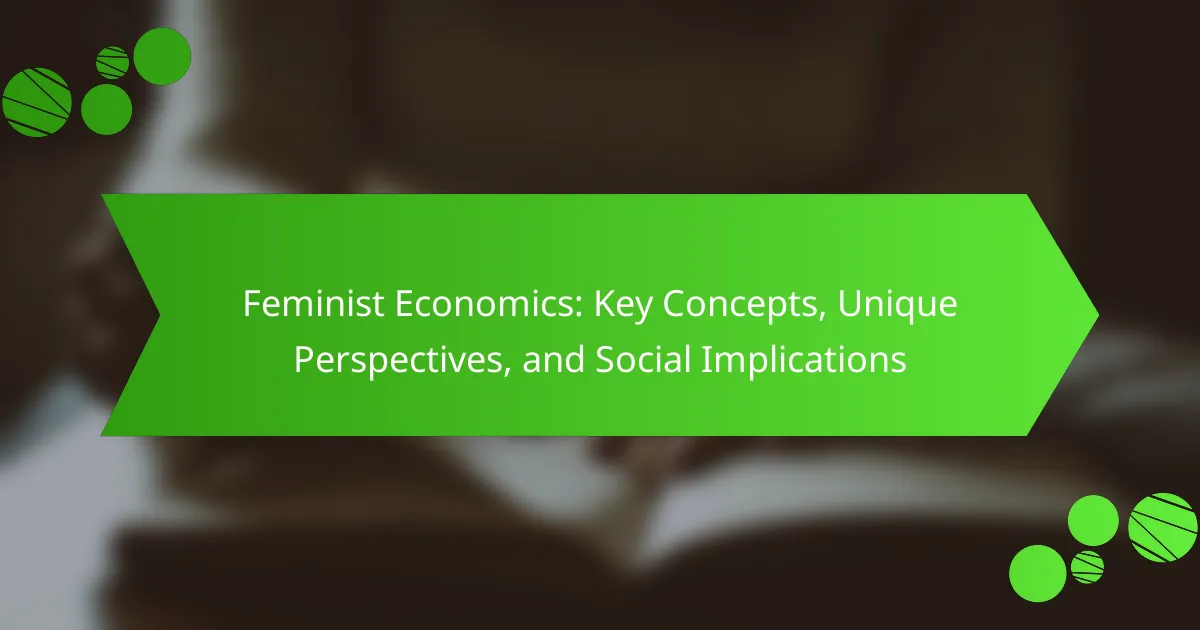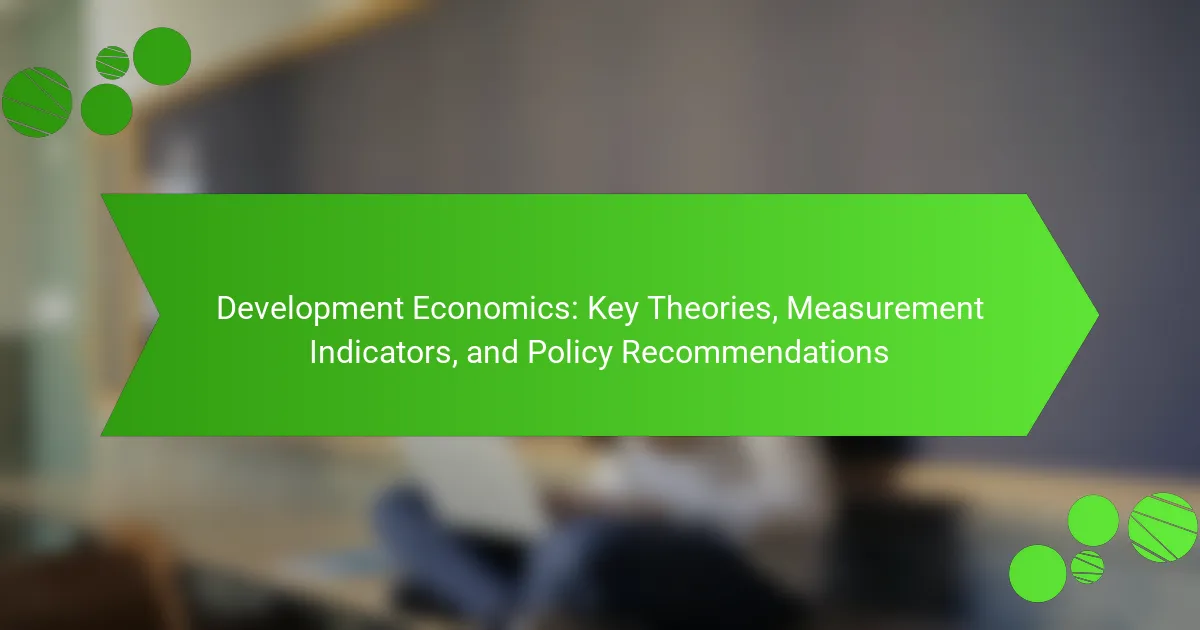Post-Keynesian Economics is a school of thought that emphasizes the significance of uncertainty and effective demand in economic processes, challenging the efficiency of markets and the neoclassical focus on equilibrium. It critiques traditional economic theories and advocates for active government intervention to stabilize the economy, promote full employment, and address income distribution. The methodology of Post-Keynesian Economics includes historical analysis and non-ergodic theory, highlighting the unpredictability of economic systems and the influence of social structures. This approach is particularly relevant for policy-making, as it supports fiscal stimulus and recognizes the role of demand in driving economic growth while addressing issues of inequality and unemployment.

What are the core ideas of Post-Keynesian Economics?
Post-Keynesian Economics emphasizes the importance of uncertainty and the role of effective demand in the economy. It argues that markets are not always efficient and can lead to cyclical fluctuations. This school of thought critiques the neoclassical focus on equilibrium and rational expectations. It highlights the significance of historical time and path dependency in economic processes. Additionally, Post-Keynesian Economics advocates for active government intervention to stabilize the economy. It supports policies aimed at full employment and income distribution. The approach also values the role of financial markets and their impact on real economic activity. These core ideas reflect a departure from traditional economic theories, focusing on real-world complexities.
How does Post-Keynesian Economics differ from classical economics?
Post-Keynesian economics differs from classical economics primarily in its emphasis on uncertainty and the role of demand in driving economic activity. Classical economics typically assumes that markets are self-correcting and that supply creates its own demand. In contrast, Post-Keynesian economics argues that demand is the primary driver of economic growth and employment.
Post-Keynesians reject the classical notion of equilibrium as a normal state of the economy. They emphasize the importance of historical time and the impact of institutions and social factors on economic outcomes. Additionally, Post-Keynesian economics focuses on the role of effective demand, which can be influenced by factors like consumer confidence and investment behavior.
Evidence supporting these differences can be found in the works of economists like Joan Robinson and Hyman Minsky, who highlighted the instability of financial markets and the significance of demand-driven growth. Their research illustrates that economies can remain in a state of disequilibrium for extended periods due to inherent uncertainties.
What key principles define Post-Keynesian thought?
Post-Keynesian thought is defined by several key principles. These include the emphasis on uncertainty and the role of effective demand. Post-Keynesians argue that markets are not always self-correcting. They highlight the importance of historical time in economic analysis. Additionally, they focus on the significance of income distribution and its impact on economic outcomes. Post-Keynesians advocate for government intervention to stabilize the economy. They also stress the importance of financial markets in influencing real economic activity. These principles distinguish Post-Keynesian economics from other schools of thought.
Why is uncertainty a central theme in Post-Keynesian Economics?
Uncertainty is a central theme in Post-Keynesian Economics because it fundamentally shapes economic behavior and decision-making. This school of thought emphasizes that individuals and firms operate under conditions of incomplete information. They cannot predict future events with certainty, which leads to cautious and often suboptimal choices.
Post-Keynesians argue that this uncertainty affects investment decisions and consumption patterns. For example, businesses may delay investments during uncertain economic conditions. Historical evidence shows that periods of high uncertainty often correlate with lower economic growth.
Additionally, the concept of fundamental uncertainty, introduced by John Maynard Keynes, suggests that some events cannot be predicted at all. This challenges traditional economic models that assume rational expectations. Therefore, uncertainty is not just a minor factor; it is a core element that influences economic dynamics and policy implications in Post-Keynesian Economics.
What role does effective demand play in Post-Keynesian Economics?
Effective demand is central to Post-Keynesian Economics. It determines the level of economic activity and employment. Post-Keynesian economists argue that demand drives production rather than supply. This contrasts with classical economic theories. Effective demand reflects the actual spending in the economy. It includes consumption, investment, and government spending. When effective demand is insufficient, it leads to unemployment and economic stagnation. Historical evidence shows that economies often operate below potential output due to inadequate effective demand. Thus, policy measures should focus on boosting effective demand to ensure full employment and economic stability.
How does effective demand influence economic outcomes?
Effective demand significantly influences economic outcomes by determining the level of production and employment in an economy. When effective demand is high, businesses increase production to meet consumer needs. This leads to higher employment rates as companies hire more workers. Conversely, low effective demand results in decreased production and higher unemployment. Historical data from the Great Depression illustrates this relationship. During this period, a severe drop in effective demand led to widespread unemployment and economic stagnation. Thus, effective demand serves as a crucial driver of economic activity and overall economic health.
What are the implications of effective demand for policy-making?
Effective demand significantly influences policy-making by shaping economic strategies. It determines the level of output and employment in an economy. Policymakers must consider effective demand to address unemployment and inflation. Increased effective demand can lead to higher production and job creation. Conversely, insufficient demand may result in economic stagnation. Historical examples include the New Deal policies in the 1930s, which aimed to boost demand during the Great Depression. Research shows that countries focusing on demand-side policies often experience more stable growth. Thus, effective demand is crucial for developing policies that foster economic stability and growth.
How do Post-Keynesian economists view the role of government?
Post-Keynesian economists view the role of government as essential for managing economic stability and promoting social welfare. They argue that government intervention is necessary to address market failures and ensure full employment. Post-Keynesians emphasize that the government should play an active role in regulating the economy through fiscal and monetary policies. This perspective is rooted in the belief that markets are often inefficient and can lead to prolonged periods of unemployment. Historical evidence shows that during economic downturns, government spending can stimulate demand and support recovery. Additionally, Post-Keynesians advocate for policies that reduce income inequality and provide public goods. They believe that such measures contribute to a more equitable and sustainable economy.
What is the significance of fiscal policy in Post-Keynesian theory?
Fiscal policy is significant in Post-Keynesian theory as it plays a crucial role in managing economic demand. Post-Keynesians argue that government intervention through fiscal policy is necessary to stabilize the economy. They believe that in times of economic downturns, increased government spending can stimulate demand and reduce unemployment. This perspective contrasts with classical theories that prioritize market self-correction. Empirical evidence supports that countries employing active fiscal policies during recessions tend to recover faster. For instance, the fiscal measures taken during the 2008 financial crisis helped mitigate deeper recessions in several economies. Thus, fiscal policy is essential for achieving full employment and economic stability within the Post-Keynesian framework.
How do Post-Keynesians address income distribution and inequality?
Post-Keynesians address income distribution and inequality by emphasizing the role of effective demand and the distribution of income. They argue that income distribution affects consumption patterns and overall economic performance. Unequal income distribution leads to lower aggregate demand, which can hinder economic growth. Post-Keynesians advocate for policies that promote fairer income distribution. These policies include progressive taxation and stronger labor rights. They believe such measures can enhance economic stability and growth. Historical evidence shows that more equitable income distribution leads to higher levels of investment and consumption. Therefore, addressing inequality is essential for achieving sustainable economic outcomes.

What are the methodological approaches in Post-Keynesian Economics?
Post-Keynesian Economics employs several methodological approaches. These include historical analysis, which emphasizes the importance of historical context in understanding economic phenomena. Another approach is the use of non-ergodic theory, which recognizes the unpredictability of economic systems. Additionally, Post-Keynesianism values the role of institutions and social structures in shaping economic outcomes. It often critiques neoclassical models for their reliance on equilibrium and rational expectations. Furthermore, Post-Keynesians advocate for a pluralistic approach, integrating insights from various schools of thought. This diversity enriches the analysis of economic issues. Overall, these methodologies reflect a commitment to realism and complexity in economic theory.
How do Post-Keynesian economists conduct their research?
Post-Keynesian economists conduct their research through a combination of theoretical analysis and empirical investigation. They emphasize the importance of historical context and institutional factors in economic analysis. This approach often includes the use of non-linear models to capture the complexities of economic behavior. They also focus on the role of uncertainty and expectations in shaping economic outcomes.
Post-Keynesian research frequently involves case studies to understand real-world economic phenomena. Additionally, they utilize a pluralistic methodology, incorporating insights from various schools of thought. This allows for a more comprehensive understanding of economic issues.
Theoretical frameworks are often derived from the works of John Maynard Keynes and later scholars. Empirical studies may include statistical analysis of macroeconomic data to validate their theories. Overall, Post-Keynesian economists aim to provide insights that are relevant for policy-making and economic reform.
What is the importance of historical context in Post-Keynesian analysis?
Historical context is crucial in Post-Keynesian analysis as it shapes economic theories and policies. Understanding historical events allows economists to assess the effectiveness of past policies. Post-Keynesian analysis emphasizes the role of uncertainty and historical time in economic behavior. This perspective critiques the assumption of static economic models. Historical context helps identify patterns in economic crises and responses. For instance, the Great Depression influenced Keynesian thought and later Post-Keynesian developments. By examining historical data, economists can better understand current economic challenges. Thus, historical context enriches Post-Keynesian analysis by grounding it in real-world experiences.
How do Post-Keynesians utilize models in their methodology?
Post-Keynesians utilize models to analyze economic phenomena through a non-orthodox lens. They focus on real-world complexities rather than abstract assumptions. Models often emphasize the role of uncertainty and the importance of historical context. Post-Keynesian models typically incorporate behavioral factors and institutional influences. They challenge the notion of equilibrium prevalent in neoclassical models. Instead, they highlight the significance of dynamic processes and path dependency in economic systems. This approach reflects their belief in the inherent instability of capitalist economies. Empirical validation is crucial for Post-Keynesians, as they seek to ground their models in observable data.
What are the critiques of Post-Keynesian methodologies?
Critiques of Post-Keynesian methodologies focus on their perceived lack of formalization. Critics argue that Post-Keynesian economics often relies on qualitative analysis rather than quantitative models. This can lead to difficulties in empirical validation. Additionally, some economists claim that Post-Keynesian approaches are overly reliant on historical context. This reliance may limit their applicability to current economic conditions. Furthermore, critics note that Post-Keynesian methodologies can sometimes neglect microeconomic foundations. This oversight can result in insufficient explanations of individual behavior in economic models. Lastly, the diversity within Post-Keynesian thought can lead to inconsistencies in methodology and conclusions. These critiques highlight challenges in establishing a cohesive framework for Post-Keynesian economics.
How do critics argue against the empirical validity of Post-Keynesian models?
Critics argue against the empirical validity of Post-Keynesian models by highlighting their reliance on subjective assumptions. They claim these assumptions lack a solid empirical foundation. Critics also point to the models’ limited predictive power in real-world scenarios. They argue that Post-Keynesian models often fail to account for complex economic dynamics. Additionally, some economists assert that these models do not adequately incorporate data from historical economic events. The lack of rigorous testing and validation is another point of contention. Critics emphasize that this undermines the credibility of Post-Keynesian frameworks. Overall, the empirical challenges faced by these models raise questions about their effectiveness in explaining economic phenomena.
What responses do Post-Keynesian economists offer to these critiques?
Post-Keynesian economists respond to critiques by emphasizing the importance of uncertainty and the non-ergodic nature of economies. They argue that traditional models fail to account for the inherent unpredictability of economic behavior. Post-Keynesians highlight the significance of effective demand in driving economic activity. They assert that market forces alone do not ensure full employment or economic stability.
Additionally, Post-Keynesians critique the reliance on rational expectations, arguing that individuals often act based on historical experiences rather than perfect foresight. They advocate for a focus on income distribution and its impact on consumption patterns. This perspective challenges the notion that savings automatically lead to investment.
Moreover, Post-Keynesians stress the role of institutions and social norms in shaping economic outcomes. They propose that government intervention is necessary to address market failures and promote social welfare. Their responses are rooted in a historical and institutional analysis of economic processes, which they believe provides a more accurate depiction of real-world dynamics.

What is the policy relevance of Post-Keynesian Economics?
Post-Keynesian Economics is highly relevant for policy-making. It emphasizes the importance of demand in driving economic growth. This school of thought advocates for active government intervention to stabilize the economy. Policies such as fiscal stimulus are central to its approach. Post-Keynesians argue that markets do not always clear, leading to prolonged unemployment. They stress the significance of uncertainty in economic decision-making. This perspective influences policies aimed at reducing inequality and promoting full employment. Empirical evidence supports the effectiveness of Post-Keynesian policies during economic downturns, as seen in various historical contexts.
How can Post-Keynesian principles inform economic policy?
Post-Keynesian principles can inform economic policy by emphasizing the role of effective demand in driving economic growth. They argue that government intervention is necessary to stabilize the economy during downturns. This intervention can take the form of fiscal policies, such as increased public spending and tax cuts.
Post-Keynesians advocate for policies that promote full employment and income distribution. They believe that a focus on wage growth can enhance consumer spending. This approach contrasts with classical economics, which often prioritizes supply-side measures.
Historical evidence supports these principles, as seen in the post-World War II economic expansion, where government spending played a crucial role. Additionally, the 2008 financial crisis highlighted the need for active policy responses to mitigate economic instability.
By addressing the inherent uncertainties in markets, Post-Keynesian economics provides a framework for policies that prioritize social welfare and economic stability.
What specific policies do Post-Keynesians advocate for during economic downturns?
Post-Keynesians advocate for expansionary fiscal policies during economic downturns. They emphasize increased government spending to stimulate demand. This approach aims to reduce unemployment and boost economic activity. Post-Keynesians also support direct job creation programs. These programs can provide immediate relief to those affected by economic crises. Additionally, they advocate for progressive taxation to redistribute wealth. This taxation strategy can help fund social programs during downturns. Post-Keynesians argue that these policies can lead to a more stable economy. Historical evidence from the New Deal supports the effectiveness of such measures.
How do Post-Keynesian economists propose to address inflation?
Post-Keynesian economists propose to address inflation primarily through demand management and income policies. They emphasize the role of effective demand in driving economic activity. By stimulating demand, they aim to reduce unemployment and increase production capacity. This approach contrasts with supply-side measures that focus solely on increasing supply.
Post-Keynesians advocate for government intervention to regulate demand. This can involve fiscal policies such as increased public spending or tax cuts. They also support monetary policies that prioritize full employment over controlling inflation.
Income policies, such as wage and price controls, are another tool suggested by Post-Keynesians. These policies aim to curb inflation by directly managing the prices of goods and wages of workers. Historical examples include the wage-price controls implemented in the United States during the 1970s.
Overall, Post-Keynesian economists believe that addressing inflation requires a multifaceted approach that considers the broader economic context.
What lessons can policymakers learn from Post-Keynesian Economics?
Policymakers can learn several key lessons from Post-Keynesian Economics. This economic theory emphasizes the importance of effective demand in driving economic growth. It argues that markets do not always clear, leading to prolonged periods of unemployment. Post-Keynesian Economics advocates for active government intervention to stabilize the economy. This includes fiscal policies that stimulate demand during downturns.
Historical evidence supports this approach. For instance, during the Great Depression, government spending helped reduce unemployment and revive the economy. Post-Keynesians also highlight the role of uncertainty in economic decision-making. They suggest that policies should account for unpredictable market behaviors.
Additionally, Post-Keynesian Economics stresses the importance of income distribution. It posits that equitable income distribution can enhance overall economic performance. By prioritizing these lessons, policymakers can create more resilient and inclusive economies.
How can Post-Keynesian insights improve economic stability?
Post-Keynesian insights can improve economic stability by advocating for active government intervention in the economy. This approach emphasizes the importance of aggregate demand in driving economic growth. By focusing on demand-side policies, Post-Keynesians argue that governments should implement fiscal stimulus during downturns. Historical examples, such as the New Deal in the 1930s, demonstrate the effectiveness of such interventions. Additionally, Post-Keynesian theory highlights the role of uncertainty in economic behavior. This understanding can lead to more robust regulatory frameworks that mitigate financial instability. Overall, these insights provide a framework for policies that enhance economic resilience and stability.
What are the practical implications for government intervention?
Government intervention has significant practical implications in Post-Keynesian economics. It aims to stabilize the economy during periods of recession or inflation. Interventions can include fiscal policies like increased government spending or tax cuts. These actions stimulate demand and promote economic growth.
Moreover, government regulation can address market failures. For instance, it can ensure fair competition and protect consumers. The effectiveness of these interventions is supported by historical examples, such as the New Deal in the 1930s. This initiative helped mitigate the Great Depression through targeted government spending.
Additionally, Post-Keynesian theory emphasizes the importance of managing aggregate demand. By doing so, governments can reduce unemployment and enhance overall economic stability. Thus, government intervention plays a crucial role in shaping economic outcomes and addressing societal needs.
What are some best practices for applying Post-Keynesian insights in policy-making?
Best practices for applying Post-Keynesian insights in policy-making include prioritizing effective demand management. Policymakers should focus on stimulating aggregate demand to promote economic stability. This can be achieved through fiscal policy measures such as increased government spending.
Another practice is to consider the role of uncertainty in economic decision-making. Policymakers must recognize that uncertainty affects consumer and business confidence. Therefore, clear communication and stability in policy can help mitigate negative impacts.
Additionally, promoting income distribution equity is essential. Post-Keynesian economics emphasizes that equitable income distribution supports consumption and economic growth. Implementing progressive taxation and social welfare programs can help achieve this goal.
Finally, policymakers should adopt a holistic approach to economic policy. This involves integrating monetary, fiscal, and regulatory policies to address systemic issues. Such coordination can enhance overall economic resilience.
These practices align with Post-Keynesian principles and have been supported by empirical evidence in various economic contexts.
Post-Keynesian Economics is an economic theory that emphasizes uncertainty, effective demand, and the necessity of government intervention in stabilizing the economy. This article explores the core principles of Post-Keynesian thought, contrasting it with classical economics, and detailing its methodological approaches, including historical analysis and non-ergodic theory. It also discusses the implications of effective demand for policy-making, the role of fiscal policy, and the importance of addressing income distribution and inequality. Additionally, the article highlights critiques of Post-Keynesian methodologies and provides insights on how its principles can inform effective economic policy and improve stability.



